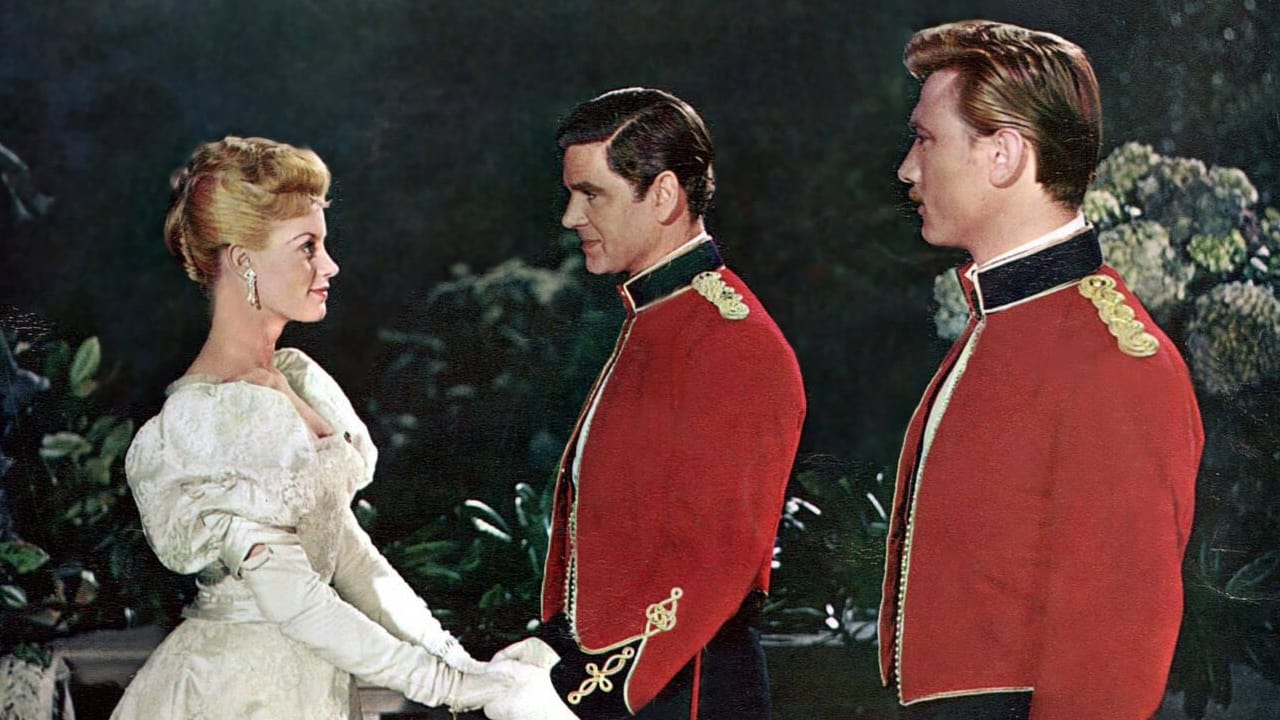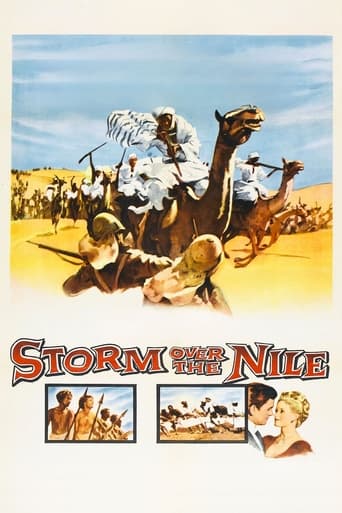


A virtual copy of the 1939 film: "The Four Feathers", based on the 1902 novel of the same title. Both were directed by Zoltan Korda, who is also the producer of the new film, taking the place of his brother in the '39 film. The present film is 8 min. shorter than the original. Much stock footage from the original film was reused. Anthony Steel takes the place of John Clements, as the lead character: Harry Faversham. James Justice takes the place of charismatic C. Aubrey Smith, with the bushy eyebrows, as General Burrows. The other players are also different in the two films.This is mainly the story of one man: Harry Faversham, torn between the desire to live a quiet comfortable life in England with his present fiancé, and his sense of duty to his recently deceased father and forebearers, and to Britain. His regiment is to be shipped to the Sudan, to reinforce General Kitchener's army, and hopefully redeem the slaughter of General Gordon, 10 years earlier. This was an imperialistic undertaking that Harry saw no sense in: a waste of good British men and materials over a rabble of peasants in a land with little obvious importance to the British Empire. Hence, he resigned his commission in the royal army: a great shock to his superiors and comrades. He received a small package containing 3 white feathers, each with a calling card attached, from 3 of his former comrades in the service, as a statement of their impression of him as a coward. Harry asked his fiancé for a white feather, but she refused, inducing Harry to pluck one from her fancy fan. The feathers made Harry change his mind as to his plans for the immediate future. He prepared to journey to Egypt and eventually the Sudan. Evidently, he felt more comfortable being a spy or some other solitary role in which he had more control over his destiny than being part of a marching army.Harry disguised himself as a despised Sangali Arab, complete with a brand on his forehead, and pretending he couldn't talk, to disguise the fact that he knew no regional language. He attached himself to a large army of rebels, where his oddity was less apparent. This army was headed away from the Nile, into the desert, where some British soldiers had been spotted. This was Kitchener's strategy, to divert the main enemy army from the Nile, so that his boats could pass unmolested up the Nile. The huge Khalifa(rebel) army quickly overran the small British force, killing many and taking the remainder prisoners, including 2 of the 3 soldiers who had sent Harry white feathers. That is, all except for Harry and the now blind Durrance: the 3rd soldier who had sent him a white feather. They had avoided capture or death by pretending to be dead, among the many corpses. "Nobody left except a blind man and a dumb lunatic" remarked Durrance. Harry led him over the desert, reaching the Nile. They fashioned a small boat out of reeds and drifted down the Nile until reaching a British installation. From there, Durrance was sent back to England. Meanwhile, Harry was thought by the British to be a thief(he refusing to talk), and sent to a prison work gang. Strangely, he found the 2 friends there. I'm confused why Harry, a captive of the British, was sent to the same prison as his 2 friends: captives of the rebels?! Eventually, Harry concocted a mass prisoner escape plan, which was to coincide with Kitchener's attack on the prison and nearby city of Omdurman(How did he know when Kitchener was going to attack?).Meanwhile, back in England, Harry's fiancé decided Harry was probably dead. Thus, she suggested that she wed the blind Durrance, having pity on him....Back in the prison, the British gunboat began shelling the prison walls as the prisoners overpowered the guards. They raised a spare British flag over the prison to stop the shelling.(Where did they obtain this flag? In someone's back pocket?) Soon, Kitchener would defeat the main rebel army nearby and take nearby Khartoum....Back in England, Durrance learned about these victories and Harry's role in one. As a result, he withdrew his engagement to Ethna, hoping she would resume her relationship with Harry, who eventually arrived. I noticed that Harry's forehead brand was gone. Plastic surgery?...Yes, Harry had returned a hero, but only with incredible luck that he should be located where and when he could help save his former comrades.This film, as well as the original, were produced in gorgeous Technicolor. Viewable at YouTube.
... View MoreZoltan Korda's remake of his own FOUR FEATHERS from 1939 drafts in a new director in the form of Terence Young and an all-star cast of British acting faces of the 1950s for a story which is hugely derivative and indeed exactly the same as the earlier tale. Further similarities between the two films are exacerbated by the liberal use of footage stolen from THE FOUR FEATHERS, which is of course the far superior (and bigger budget) film of the two, leaving this somewhat superfluous.Still, the cast alone salvages this story and makes it worth a watch. The tale is wide-reaching and fast-paced, and thoroughly interesting in its depiction of a long-vanished British Empire and the sway it once held over the known world. I found Anthony Steel a bit staid in the lead role, but the supporting players are very good. Laurence Harvey has the most characterisation and is thus the most interesting, but Ian Carmichael and Ronald Lewis make their mark too. James Robertson Justice is a scene-stealer and the likes of Geoffrey Keen and Michael Hordern add quality while Christopher Lee, Roger Delgado, and Ferdy Mayne don boot polish to play the natives.
... View MoreIn addition to the re-use of old stock footage there was an error in the scenes after he returned his blind companion to the camp. They showed a troop flying a flag that was no longer used after 1867 and this event was set in 1898. The flag shown was a crescent with 1 star, this may have been either the Ottoman Egypt or the Egyptian Eyalet. The subsequent flag, Mohammed Ali, not the boxer, was 3 crescents each with 1 star and was used from 1881 until 1914, by the Khedivate, from 1914 until 1922 it was also used by the Sultanate of Egypt. After 1922 the green flag with 1 crescent and 1 star was used by the Kingdom of Egypt. There was no separate flag of Sudan until independence, from Egypt and Britain, in 1956.
... View MoreI had the advantage of watching Zoltan Korda's 1939 'The Four Feathers' on one afternoon and this his 'Storm over the Nile' on the next and since there have been at least 5 versions filmed cannot understand why it was not issued as 'The Four Feathers' or more appropriately 'The Two Feathers' as those given to Lieutenants Thomas Willoughby and Peter Burroughs were largely irrelevant to the plot although getting Harry Faversham flogged in the original and just incarcerated in the second ? One could believe John Clements considered himself a Coward but not Anthony Steele. I would cross the street and a few deserts for Mary Ure but not June Duprez- she deserved the far from noble Ralph Richardson but not Laurence Harvey who started off the sequel. Laurence Harvey started off with a reddish brown rat on his forehead which might well have saved him from Retinal damage when his lost his Hat. Indeed it is hard to select a single Actor or Actress who was better in the original and usually considered superior version but that is after we have watched both. As a stand alone Storm over the Nile is both more watchable and allowed Zoltan Korda to clean up several nonsenses from his original. Such as how and why John Durrance became sun blind. Ralph Richardson leading his troops keeping that he was blind a secret. The hovering vultures and other reasons why LH tries more convincingly to shoot himself. How Harry Faversham passed over the so important File and the Mahdi's guards searching them for it. All in all certainly not deserving the criticism - who shouldn't any Director use the same footage twice or shoot an overlong schedule and then divide it into two ? Nobody has to pay to watch any Film or spend the time glued to the telly.
... View More